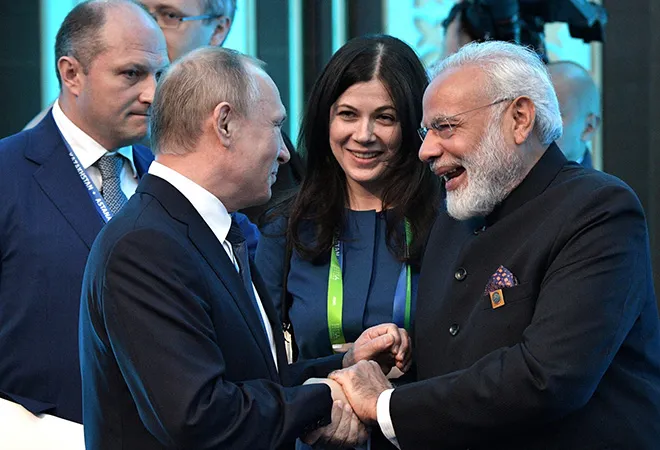-
CENTRES
Progammes & Centres
Location
India will not politically prefer Russia to the US — rather it must learn to work with both. In the Indo-Pacific, India’s equities lie with Washington, who’s economic and security presence can balance China’s rise. In Eurasia, Moscow will be its most important partner.

Image Source: Press Trust of India
This interview originally appeared on Russia TV.
Samir Saran: Given President Trump’s rather vague response on the question of exemptions for India, it is clear that the foreign policy establishment in Washington is still uncertain on how to proceed.
Having said that, India is both an attractive market for American arms dealers, and is the lynchpin of America’s ‘Free and Open Indo-Pacific’ strategy. Both weapons manufacturers and the strategic community in Washington will probably weigh in favour of India.
Whatever the near term consequences for India, therefore, Washington will be compelled to accommodate India’s interests in the long term.
SS: The S-400 is a sophisticated anti-access/area denial missile system — a platform that no other country is likely to provide India, not even Washington. It will act as a crucial force multiplier in India’s border areas.
SS: For me, the important takeaway was Russia’s offer to allow India to participate in energy and trade projects in the Arctic. This is an emerging, if often ignored, theatre of geopolitics. There will be a race to exploit the regions commercial opportunity and to define its governance architecture. It remains to be seen what India’s response to this will be. I hope the mandarins in New Delhi see the strategic importance of being a stakeholder in this geography.
SS: In the long term, India is an invaluable partner for Washington. Indeed by mid-century, India will emerge as one of the world’s largest economies — a process that will foster a gradual and organic rise in its strategic capabilities.
Two expectations will underpin Washington’s choices going forward. First, that investing in India’s defense industry will help Delhi balance China’s rise in the Indo-Pacific. And second, that India will eventually be able to anchor democratic norms and free trade in Asia by its own desires and design.
SS: Russia is not changing its position on Kashmir — Moscow’s courtship of Pakistan is based on two realities. First, that Pakistan will remain an interlocutor in Afghanistan, and will be important to Russia’s ambitions in Central Asia. Second, geopolitical equations in the region are changing rapidly — and just as India is reaching out to new partners, so is Moscow.
It is too early to pass judgement on these evolving partnerships. They are often driven by near term interests and global political uncertainty. It is very unlikely, however, that Russia will upset India over a highly sensitive issue like Kashmir.
India will not politically prefer Russia to the US — rather it must learn to work with both. In the Indo-Pacific, India’s equities lie with Washington, who’s economic and security presence can balance China’s rise. In Eurasia, Moscow will be its most important partner.
SS: In the face of American sanctions, Russia’s only real choice is dependence on and partnership with China. While the close partnership between Moscow and Beijing certainly poses a problem for India, Moscow must also introspect on the sustainability of its arrangement.
Russia should be anxious about being economically and militarily displaced by China in Central Asia and Eastern Europe. The fact is that if Moscow seeks a multipolar Eurasia, it will have to bring India into the arrangement or risk acquiescing to China’s design.
SS: While both countries agree that peace in Afghanistan is a priority, they differ over political arrangements that need to be made. Further, with the US, Russia, China, Iran and Pakistan all in the mix, the situation in the region remains complex.
With Putin, India likely reiterated its long standing position that any initiative in Afghanistan must be led by the government. India might have also pushed forward the agenda agreed upon in Sochi — of pursing joint development projects in Afghanistan with Moscow.
SS: CPEC is one amongst many objections that India has about the Belt and Road Initiative. The real issue, however, is that the BRI is a project designed, funded and executed only by China. As a key actor in the Asian century, India cannot allow China to dictate the terms of Asia’s governance.
China must adopt a more multilateral playbook if it wants Indian support for the BRI. India and other Asian powers must have a legitimate voice in creating the rules and institutions of the region and in benefitting from the commercial and trade opportunities.
The views expressed above belong to the author(s). ORF research and analyses now available on Telegram! Click here to access our curated content — blogs, longforms and interviews.

Samir Saran is the President of the Observer Research Foundation (ORF), India’s premier think tank, headquartered in New Delhi with affiliates in North America and ...
Read More +